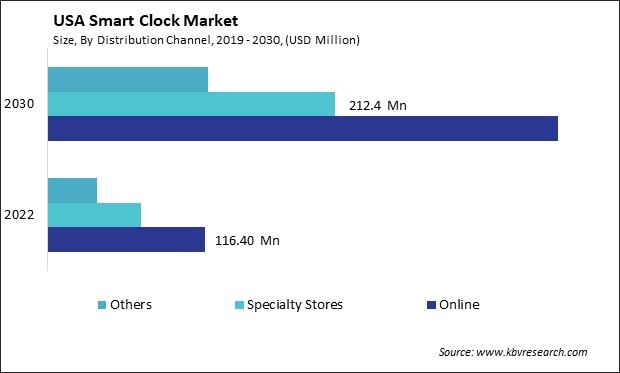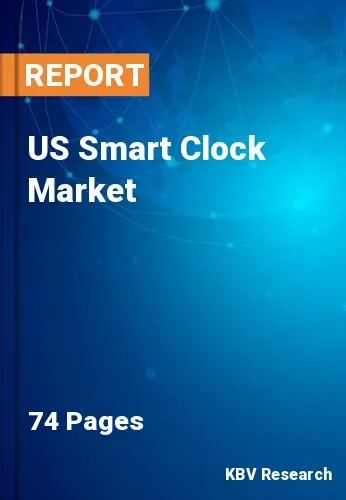The Smart Clock Market size is expected to reach $708.4 million by 2030, rising at a market growth of 15.8% CAGR during the forecast period. In the year 2022, the market attained a volume of 4,454.5 thousand units, experiencing a growth of 15.7% (2019-2022).
The smart clock market in the U.S. has witnessed significant growth in recent years, driven by technological advancements, increased consumer awareness, and the growing trend of smart home integration. The integration of artificial intelligence, improved connectivity, and enhanced features will likely contribute to the expansion of the market. Additionally, as the world gradually recovers from the pandemic, the lasting impact on remote work and the desire for connected home environments are expected to sustain the demand for smart clocks in the post-COVID era.

Moreover, the heightened awareness of health and hygiene during the pandemic has prompted the integration of health-related features into smart clocks. Some devices now include sensors for monitoring indoor air quality, providing users with real-time information about their living environment.
The retail industry in the U.S. has experienced a notable upswing in the smart clock market, with consumers increasingly embracing these tech-savvy timepieces. The demand for smart clocks has surged due to their multifunctional feature. Retailers have capitalized on this trend by enhancing in-store displays and creating dedicated sections for smart clocks. The rise in consumer interest, coupled with innovative product offerings, has led to robust sales and a growing market presence for smart clocks within the retail landscape, reflecting a broader shift towards interconnected and technologically advanced lifestyle products.
According to the United States Census Bureau, U.S. retail e-commerce sales, reached an estimated $284.1 billion in the third quarter of 2023. This reflected a notable 2.3% surge compared to the preceding quarter. Total retail sales for the third quarter of 2023 were estimated at $1,825.3 billion, an increase of 1.5 % from the second quarter of 2023. Drawing a parallel, the smart clock market in the U.S. also experienced a rising trend during this period.
The IoT has transformed the U.S. smart clock market, ushering in unprecedented connectivity and functionality. In the United States, the expansion of IoT in the smart clock market is characterized by a seamless amalgamation of cutting-edge technology and everyday convenience. These intelligent timepieces are now equipped with sensors and connectivity features that enable them to synchronize with various smart home devices, providing users with a centralized hub for managing their connected ecosystem. IoT-enabled smart clocks have evolved into multifunctional hubs, from adjusting room temperatures to controlling lighting, enhancing the overall smart home experience.
Moreover, the U.S. emphasis on data-driven insights has fueled the integration of IoT sensors in smart clocks. These sensors can collect and analyze user behavior, allowing personalized time management suggestions and facilitating a more efficient daily routine. This level of customization resonates with the American consumer, who values products that adapt to their unique preferences. Hence, the pervasive integration of IoT in the U.S. smart clock market signifies a paradigm shift, offering a seamless and personalized experience that aligns with the nation's tech-forward and convenience-driven lifestyle.
In the rapidly evolving landscape of smart technology, the U.S. smart clock market has witnessed a transformative shift with the integration of voice control and artificial intelligence (AI). This trend reflects growing consumer demand for seamless, intuitive interactions with their devices and the desire for increased automation and personalization in daily routines. Voice control has become a cornerstone feature in the U.S. smart clock market, allowing users to use natural language to command and interact with their devices.
The integration of AI further enhances the smart clock market in the U.S. Advanced algorithms enable these devices to learn user preferences over time, adapting to individual lifestyles and providing personalized recommendations. For instance, AI algorithms can analyze sleep patterns, suggesting optimal wake-up times or adjusting ambient lighting based on circadian rhythms.
In a country where fast-paced lifestyles are the norm, the U.S. smart clock market responds to the need for multifunctional devices. These clocks serve as timekeepers and hubs for information, entertainment, and smart home control. Users can seamlessly integrate their calendars, receive news updates, and even engage in hands-free communication through these intelligent timepieces. Thus, as the U.S. smart clock market embraces voice control and AI integration, consumers experience a shift towards personalized and automated interactions.
The smart clock market in the United States has witnessed significant growth in recent years, driven by technological advancements and the increasing demand for connected devices. Several companies have emerged as key players in this rapidly expanding market, offering innovative smart clock solutions to cater to diverse consumer needs. Lenovo is also a key contender in the U.S. smart clock market, offering products like the Lenovo Smart Clock. This compact device is designed specifically for the bedroom, featuring a sunrise alarm clock and Google Assistant integration. Lenovo's focus on the bedroom sets its smart clock apart, catering to users who prioritize features like sleep tracking and relaxation routines.
An emerging player is Lumetric, a startup based in Silicon Valley. Lumetric focuses on creating smart clocks that combine minimalist design with intelligent features. Their clocks often include weather updates, customizable LED displays, and integrations with popular smart home platforms. Lumetric aims to carve a niche in the market by offering locally designed and engineered smart clocks that cater to the tech-savvy consumer.
Anker, a well-known brand for charging solutions, has expanded into the smart clock market with the Eufy Smart Clock. Eufy's smart clock emphasizes privacy by not featuring a camera, making it a popular choice for users concerned about security in their bedrooms. The device includes voice control and serves as a central hub for managing other smart home devices.
LaMetric has gained recognition for its smart clock products in the United States that focuses on customization and versatility. The LaMetric time smart clock allows users to display various information such as weather, social media notifications, and productivity metrics in addition to standard clock features. The company's emphasis on personalization sets it apart in the market.
Minnesota, a company based in Dassel, specializing in synchronized clock systems. While their primary focus is on providing precise timekeeping solutions for schools, hospitals, and other institutions, they have expanded into the smart clock arena. American Time's Wi-Fi Network Clocks offer connectivity features, allowing users to control and synchronize multiple clocks seamlessly.
In the educational sector, the Hatch Restore Smart Sleep Assistant has gained attention. While primarily designed to improve sleep quality, it also functions as a smart clock with customizable wake-up routines, ambient sounds, and a reading light. Hatch's focus on sleep hygiene sets it apart in the market, appealing to those who prioritize a good night's rest. As technology continues to advance, it is likely that the smart clock market provides U.S. consumers with an expanding range of options for smart and connected timekeeping solutions.
By Distribution Channel
Our team of dedicated experts can provide you with attractive expansion opportunities for your business.

